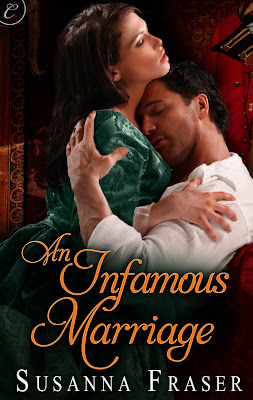Hi, I’m Susanna, and I have trouble with titles.
Not the aristocratic kind. I’ve spent enough time reading and writing the Regency over the past decade that how to speak of dukes, earls, and their relations no longer mystifies me. No, I struggle to name my books.
I’ve now sold four manuscripts, and I’ve yet to have a single one go on sale wearing the first working title to grace my hard drive’s work-in-progress file.
The first book I wrote (the second I sold) began life as Lucy and Mr. Wright. In its first draft, it was a traditional Regency, and the hero was a wealthy but untitled gentleman. Upon further consideration, I promoted James to baronet and renamed the book Lady Wright. Then I realized I wanted to bump James yet higher on the totem pole, so he became James Wright-Gordon, Viscount Selsley. Unfortunately this meant no more clever puns on “Wright,” so I went with The Inconvenient Bride. Years later, as I prepared to submit it to Carina, I decided the title needed a little more oomph and changed it to A Marriage of Inconvenience.

When I started my next manuscript, I was still hung up on those trad-Regency-style titles, so I called it Anna and the Sergeant. However, I quickly realized it just wasn’t a trad story and switched to Soldier’s Lady. Which isn’t a bad title, but it didn’t say, “Get your forbidden star-crossed cross-class lovers here!” quite as loudly as I wanted it to. Hence, The Sergeant’s Lady.
Carina published both those books under the titles I used for submission–possibly because I’d had so long to think them over that I’d actually come up with something good. With my next two sales, my editor’s acceptance email basically read: “Congratulations! We love your book! Your title? NSM. Here’s a worksheet to fill out so we can work together to find something better.”
My November 5 release began life as The General’s Mouse. The hero, Jack, marries the heroine, Elizabeth, upon minimal acquaintance to fulfill a deathbed promise to his best friend. At the time he isn’t seeing her at her best, and he glumly reflects that he’s married a mouse. The rest of the book is all about proving that his so-called mouse has a mighty roar. Clever? Maybe. Based on the title alone, does it sound like a cute kid’s fantasy book about a talking mouse who befriends one of history’s great commanders? Absolutely.
So I brainstormed with my critique partners and filled out the title worksheet. Carina chose one of my suggestions, An Infamous Marriage, which I fully acknowledge is much better than my first choice.
Just this month Carina acquired my first-ever novella. (It took several tries, but eventually my muse accepted that stories can come in sizes other than 90,000 words.) It’s an interracial romance set in the immediate aftermath of the Battle of Vittoria in 1813, where some British soldiers made fortunes by plundering the captured French baggage train. The plot revolves around a particularly fine ruby necklace my recently widowed heroine is trying to conceal from the soldiers surrounding her so she can go home to England, sell it secretly, and use the proceeds to buy a happy, secure life for herself and her young son.
At first, I called it Widow’s Fortune. But I soon decided that was too prosaic and changed it to Far Above Rubies, which I thought sounded particularly evocative. It comes from Proverbs 31:10, “Who can find a virtuous woman? for her price is far above rubies.” I saw it as both a literal reference to how the hero cherishes the heroine and a symbol for the characters’ dreams of a better life and how they’re able to fulfill them together.
The editorial team, however, thinks it sounds more like a fantasy than a historical…and I figure they’re the experts, so it’s back to the title worksheet for me!
I’ve come to a place of acceptance where I don’t expect my first idea or two to work. In fact, my current ideas in various stages of brainstorming or drafting go by Home Run Blast from the Past (time travel!), Hell, Frozen Over (a winter survival tale), and The One With the Battle of New Orleans (which opens at–wait for it–the Battle of New Orleans). Now I just have to think of something presentable before they go anywhere near my editor’s inbox…
Over to you–what makes a title good or bad? What are some of your favorites and least favorites?

.jpg)

.jpg)


